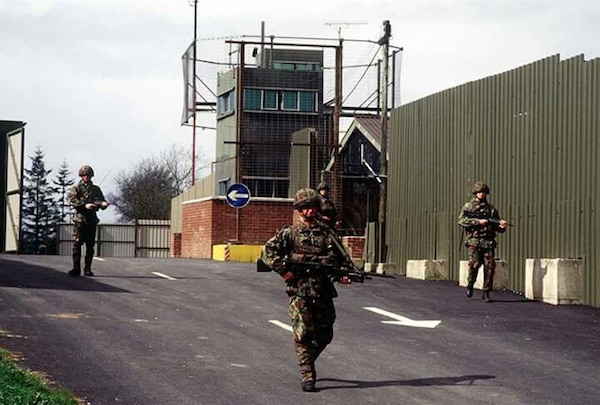
A secret memo written by a British Army general during the early years of the current conflict refers to Britain needing to find a way to “gradually escape” from its involvement in the north of Ireland.
The memo was discovered by researchers working for a documentary series for BBC TV’s Spotlight programme. It was written by Michael Carver, who was providing advice to the British government in 1972 as the British Army’s chief of staff. There is no indication if the document was read or if there was any response.
The former chief of staff wrote: “If I am right, and we want a lasting solution, it must lie in finding a way in which HM Government can gradually escape from the commitment to the border.”
He suggested a “plebiscite”, or poll, organised “in such a way that it shows up the inequity of the existing border”.
The researchers also documented a new allegation of paramilitary involvement against Ian Paisley Sr, who went on to become DUP leader and First Minister.
A former senior British Army officer, David Hancock, told the programme Paisley had personally paid for a unionist paramilitary bombing in Kilkeel in 1969.
Targeting a viaduct carrying water to Belfast, the UVF bomb was blamed on the IRA, but was in fact part of a loyalist campaign designed to destabilise the Stormont regime of Six County Prime Minister Terence O’Neill.
The unionist leader was considered by Paisley and his supporters to be too moderate. At the time, O’Neill was said to be preparing reforms to meet some of the demands of the civil rights movement.
Mr Hancock, who was stationed nearby, actually heard the viaduct explosion and said it did “not have the footprint of the IRA”. He said the then RUC police had shown him evidence that Paisley, at that time a fundamentalist preacher and prominent unionist extemist, had supplied the finances for the explosion.
Mr Hancock recalled: “I was good friends with the district inspector down in Kilkeel. He showed me the evidence that they had of the involvement of money from Paisley into what was then called the UVF, where they got the explosives from, how it was carried out, who did it, and why.”
Paisley’s links to loyalist paramilitarism over the years are well known, particularly in the 1960s, but no charges were ever brought against him for direct involvement in paramilitary violence.
His son, North Antrim MP Ian Paisly Jr said he was “not surprised at all by the depths to which the BBC would sink in its hatred of my late father and my family”.
A BBC spokesperson said they had “complete confidence” in the integrity of the programme.
![[Irish Republican News]](https://republican-news.org/graphics/title_gifs/rn.gif)
![[Irish Republican News]](https://republican-news.org/graphics/title_gifs/harp.gif)

